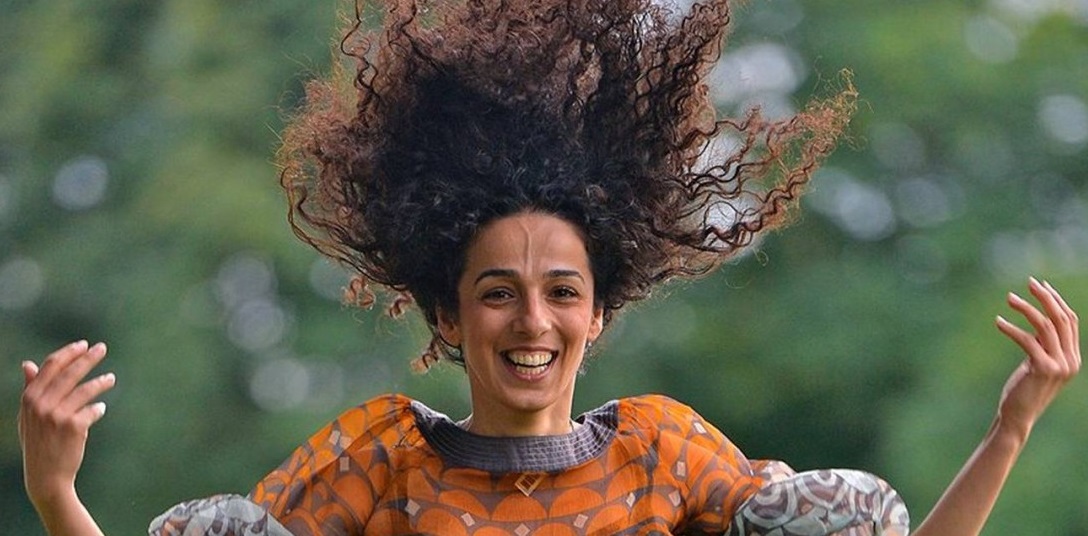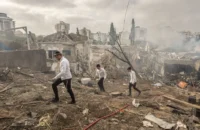“And I’m a master criminal because the government thinks I have too much hair, too much voice, and I am too much of a woman.”
by ALLISON MALONEY
Speaking to a packed house today, journalist Masih Alinejad took the stage at the Women in the World New York Summit to speak with host Tina Brown about living in political exile from her native Iran and her campaign against the forced wearing of hijab, or headscarves. The energetic Alinejad, 39, issued a passionate call to American political leaders and public figures: “Do not ignore Iranian women when they put themselves in danger.
The Iranian Revolution in 1979 instituted conservative social codes, including an order that all women must wear hijab. Women in Iran remain unable to pursue an education without their father’s permission, sing solo, or dance. In the street, they may be stopped by “morality police” whose job is to enforce proper Islamic dress. “Women in Iran are breaking the law every day just to be ourselves,” Alinejad explained. “And I’m a master criminal because the government thinks I have too much hair, too much voice, and I am too much of a woman.”
Her full head of curly hair — and contagious enthusiasm — were well appreciated by the audience.
Raised in a rural village, Alinejad said her family insisted she wear the headscarf from the age of seven. “It can be part of your body,” she explained as an old photo of her family flashed across the screen. My Stealthy Freedom, her movement against the mandate, began in 2013 when she posted a photo of herself sans headscarf on Facebook. Banished from her home country and living in the United States, she used the caption to celebrate a simple pleasure: the freedom of wind in her hair. “Maybe it’s nonsense to you, but to us, it means a lot,” she told the crowd.
“My hair was like a hostage in the hands of Iranian government,” Alinejad wrote in her post. Iranian women responded in hordes to the image and her words, expressing a desire for freedom from compulsory hijab, but also scolding the activist for breaking the law. Shortly afterward, she posted a second picture of herself taken in Iran, writing, “We know that we don’t have freedom inside Iran, but when we don’t see the police around, we know how to take off our scarf and create a moment of freedom, like guilty pleasure, and in stealth.”
A movement was born. Using social media, Alinejad essentially handed a megaphone to Iran’s women. Pictures of women disrupting the law by removing their headscarves have flooded her inbox ever since, including some from non-Iranian tourists. “Some say this is breaking the law, but being a woman in Iran means breaking the law all the time,” she explained. “Just giving them a voice means a lot. Without sending a picture, they’re in danger anyway.”
Alinejad’s public display of independence and the subsequent expressions of freedom by other women did not go unnoticed by Iranian authorities, who already knew her name well. At age 19, while pregnant, Alinejad had been jailed for distributing leaflets and posting graffiti that criticized the Islamic Republic. The Iranian authorities have called her a “heretic” and a “whore.” In 2009, she was banished from the country for exposing corruption in the Iranian Parliament as part of the Green Revolution, in which young people took to the streets to demand that then-president Mahmoud Ahmadinejad step down from his post following election season. Protesters’ efforts were brutally crushed by the state; dozens were tortured or beaten to death. Others went missing and have never been found.
A world away in Brooklyn, Alinejad—who has not seen her parents since the her banishment—realized that “with a mobile phone and a laptop, I can be my own country.” She set out on a journalistic project to connect with mothers who lost loved ones during the uprisings, interviewing 57 family members of the missing, tortured and killed.
“Iran has a history of violence against their own people. And these mothers are the bravest people,” she said, noting that some went to jail for speaking to her. “They never had the chance to sit down like this and talk about their children,” said Alinejad, gesturing to the crowd. “[The government] tried to keep them silenced, but the only voice you hear coming from Iran is mothers.”
Alinejad said she desperately misses her family. “My mother cannot read or write, and you can see she wears hijab, but she understands me,” she said, calling her mother the “face of Iranian mothers.” Her father was upset when she launched My Stealthy Freedom, she explained. “I miss him, but he wanted to take me to heaven by force. That’s why it took me three years outside of Iran to be myself. The government of Iran are not here, but I did not want to break my father’s heart.”
The government has made attempts to silence her. The Iranian state television station, Press TV, disseminated false reports that Alinejad was gang raped in London as a consequence of going uncovered. “They [were] not even ashamed to make my son a fake witness,” she said. Her mother and father believed the false reports until they were able to speak with her.
A year later, Press TV host Sheena Shirani recorded an explicit phone call in which a news editor relentlessly pushed her for sex. Alinejad helped break the story by posting the audio online, exposing the climate of sexual harassment within the state news organization. Though an investigation was promised, Shirani was forced to flee the country and Hamid Reza Emadi, the news editor, remains in Iran. “This is their mind-set; this is the way they think. They’re raping people,” she said, speaking to the physical and psychological terror women in Iran experience even when they wear hijab.
“If I go back to Iran, those people who rape you in their mind, I’m not sure what they’re going to do to me,” she said. “I still cry for myself, my family, my people. I cannot forget about them.”
Read more



























